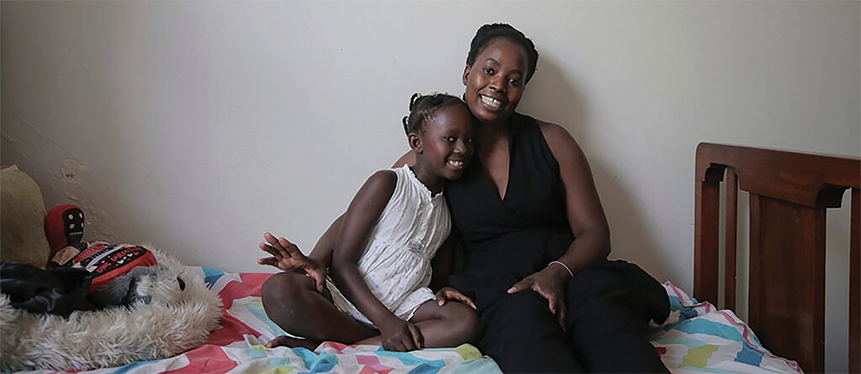AGONY: Mother and daughter wrongfully declared stateless by a dysfunctional system…
By Monk Nkomo and Spotlight
A Vosloorus mother and daughter from Ekurhuleni, were subjected to contemptuous and humiliating treatment by Home Affairs officials while trying to prove their South African citizenship status – a battle that ended in pain and tears of joy when they at last received their identity documents after nearly 17 years.
After being stateless since 2008, Phumulani Tshuma and her daughter, Primrose Modisane , who is now 36-years-old, were recognised as South African citizens in 2017 and August 2025 respectively after pressure from the North Gauteng High Court in Pretoria and Lawyers for Human Rights.
But the relief came at a heavy price because Tshuma died of throat cancer four months after she had received her identity documents.
This is the story of a mother and daughter who, despite public humiliation and financial ruin at the hands of government officials , they fought for their rights to be recognised as South Africans and not as outcasts in their own country often by a dysfunctional home affairs system.
Their nightmare began in 2008 when officials from the Department of Home Affairs arrived at a high school in Vosloorus as part of a documentation drive. That was when Primrose, a student at the school, learned that as far as the South African government was concerned, she did not exist and neither did her mother.
Modisane could not write matric exams. She could not open a bank account, get married or vote during the provincial and general elections.
Both mother and daughter were stateless, which meant no country recognised them as citizens. They became part of scores of people who had been caught up in the country’s often defective home affairs system where sometimes even DNA evidence was not enough to prove their citizenship. This could, among others, have consequences for people’s ability to access healthcare services. For foreign nationals, navigating the system can be even harder.
Modisane and her mother were part of an estimated 10 000 stateless people in South Africa and those most affected were orphaned and abandoned infants and children born to parents of different nationalities.
After being declared stateless, she left school after Grade 11 abandoning her dream of studying to become a social worker. Without identity documents, she found a job as a domestic worker. Together with her mother, they spent eight years trying to rectify the situation but in vain. They stopped after they ran out of money. Lawyers for Human Rights then championed their case from 2017.
Meanwhile, the government, which had DNA evidence of Tshuma’s citizenship as early as 2017, then recognised her as a South African citizen, but it was already too late . She passed on four months after she got her identity documents.
Modisane continued her fight for justice. In April this year, the LHR turned to the North Gauteng High Court in Pretoria for relief. The court ordered the Home Affairs department to issue her birth certificate and a South African ID within 30 days. The department only honoured this order in August after Modisane’s employer, who is the daughter of retired Constitutional Court Judge, Johan Kriegler, planned, together with her father and Modisane, to call a press conference to highlight her plight. Hours before the briefing started, they received a call from a Home Affairs official saying Modisane’s birth certificate was ready for collection. The certificate paved the way for her to obtain her ID card.
Department of Home Affairs spokesperson, Thulani Mavuso, suggested that Modisane was partly responsible for the delays before the High Court ruled in her favour in April because she did not submit a birth certificate with her application as required by law.
Modisane’s argument however, was that the problem was not that she was unwilling to bring evidence of her birth. It was that documented evidence did not exist and the department refused to help even when she had provided DNA evidence of her citizenship.
People became stateless for a range of reasons. In South Africa, Home Affairs had stripped hundreds of thousands of people of their citizenship by blocking IDs of people deemed suspicious, a process that can take years to correct. Statelessness is also fuelled by mismatched laws, discrimination, delayed birth registration or, as with Modisane, procedural barriers.
This family’s story is nonetheless one of grief, financial ruin, public humiliation and contemptuous treatment at the hands of government officials. The story of a mother and daughter and their struggle for citizenship.
In addition to Home Affairs sometimes not recognising citizens, it can also be extremely slow to update its policies and processes in response to legal developments. It might be 2025 when you join the queue at a branch office, but it seems the front desk is always stuck in the year the department’s internal policies were last updated. When it comes to citizenship issues, some revisions have lagged for more than a decade.
It’s a function of an ever-shrinking budget and a vast disconnect between the laws of South Africa, policies set at the national level and the chaos at branch offices.
Home Affairs’ performance plan for 2025 mentions a review of its policies and acknowledges that outdated and unlawful processes are driving litigation. In 2023 alone the department owed over R600 million in ‘civics’ legal costs, though the actual payouts might be lower.
Statelessness itself is costly too. A 2012 study conducted in four countries found stateless households spend and earn on average 33% less than documented households.
As Modisane’s 17-year ordeal stretched on, for instance, she learned to fear being asked where she was born. The answer to this question is Zimbabwe, and she says saying so reliably invited abuse.
Modisane says she has witnessed Home Affairs’ administrative staff, senior managers, secretaries and in one instance, a sitting High Court judge, respond to this information with varying degrees of disgust, not to mention ignorance of South Africa’s laws.
People born of a South African parent qualify for citizenship even if they were born elsewhere.
Of course, some staff misgivings aren’t always unfounded. Police operations in Gauteng and KwaZulu-Natal have uncovered a syndicate that issues South African residence permits, IDs and passports in exchange for money, but these schemes also implicate dozens of Home Affairs staff, not just undocumented people.
































